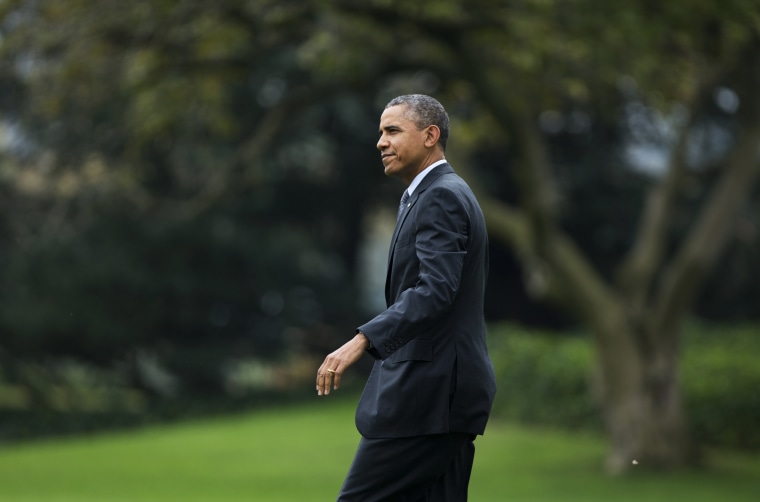President Obama had a few weeks respite from political criticism, as the public focused its anger on Republicans for driving the government shutdown. But while the GOP's approval rating is at an all-time low, according to a new NBCNews/Wall Street Journal poll, so is Obama's.
Just 42% of those polled approve of the president's performance in office--down five points from a mid-shutdown poll taken earlier this month. His disapproval rating at 51% is tied for his all-time high.
Only 22% view the GOP positively, another all-time low for the poll, and 53% say they have a negative view of the Republican Party. A 30% plurality says they see the GOP “very negatively”--another record for the poll.
Democrats haven't been immune to the public's frustration with government and lawmakers. The last NBC/WSJ poll showed Democrats with an eight point advantage on who should control Congress after the 2014 midterms; that’s now been cut in half, showing the party with only a four point edge on the generic congressional ballot, 45%-41%.
The upside for Democrats is that more Americans still blame congressional Republicans for the shutdown, by a 38%-23% margin--but 36% say both sides carry equal blame.
Both parties and their leaders have suffered across the board since early October. Voters say they have a less favorable opinion of congressional Republicans since the shutdown, by a wide 53%-9% margin, while the gap for Tea Party Republicans is 45%-12%.
After the shutdown, 41%-21% say they have a less favorable opinion of Obama instead of a more favorable one. And the president’s personal positive-to-negative rating is upside down for the first time since he took office--41% view him in a favorable light while 45% view him negatively.
House Speaker John Boehner, Senate Majority Leader Harry Reid, and Senate Minority Leader Mitch McConnell also remain unpopular.
2014 may see dramatic change in Congress, if voter dissatisfaction is any sign. A full 63% of voters want to replace their own member of Congress--the highest percentage in this poll since 1992.
Half of those polled think there will be another government shutdown, and just 22% say they think the country is headed in the right direction. Nearly three-fourths say Congress is contributing to problems instead of solving them.
Republican pollster Bill McInturff, who conducted the poll along with Democratic pollster Peter Hart, said that if the previous poll shocked Republicans, the new numbers should send shockwaves through everyone else.
“We’re mad as hell and we’re not going to take it anymore,” Hart said, paraphrasing from the movie "Network."
The messy Obamacare rollout has lowered support for the health care law. Just 37% say the law is a good idea, while 47% say the Affordable Care Act is a bad idea--a slight downward move from 38%-43% last month.
But voters aren’t sure yet whether the website glitches are an isolated problem: 37% say issues are a short-term technical problem that will eventually be fixed, but 31% say they're emblematic of a longer-term problem in the law’s design that can’t be corrected. And 30% say it’s too soon to say.
Confidence in the law itself has also eroded--40% say they’re less confident in the law now, given the rollout problems. Only 9% are more confident, but 50% say there’s been no change.
As Hart, the Democratic pollster, put it, “The sign-up problems have hurt the president personally rather than hurt the law.”
The NBC/WSJ poll was conducted Oct. 25-28 of 800 adults (including 240 cell phone-only respondents), and it has an overall margin of error of plus-minus 3.5 percentage points.
Mark Murray contributed to this report
